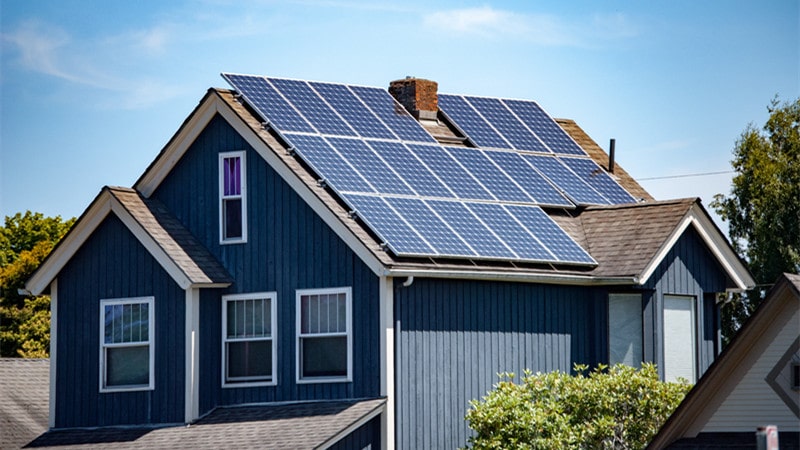Did you know that in 2022 alone, 700,000 homeowners in the United States installed solar panels? As a result, 6% of single-family owner-occupied U.S. homes now benefit from solar energy.
One of the reasons solar is increasing in popularity is its low environmental impact. Generating solar energy only requires the power of the sun, not fossil fuels. Thus, unlike carbon-rich fuels, it doesn’t produce greenhouse gases or pollutants.
As a bonus, using solar energy in homes can significantly reduce energy bills.
So does that make buying a house with solar panels already installed a wise move, then?
It depends on many factors, which we’ll discuss in this guide. Read on to discover if you should buy a house with pre-installed solar panels.
Solar Panel Wattage
Solar panels typically have a wattage ranging from 250 to 400 watts. This is a crucial factor determining their performance; the higher it is, the better.
The better the panels perform, the more solar electricity they can generate. As a result, fewer high-wattage panels may be necessary.
Therefore, one of the first things you must ask the home seller is their panels’ wattage. If they say it’s 250, but they only have 15 panels, it may not be enough for your energy needs.
The Roof’s Condition
The average residential solar panel weighs about 40 pounds. Most home systems have between 15 and 25, which equates to a total weight of 600 to 1,000 pounds.
That’s why a complete roof assessment is necessary before installing solar panels. This test ensures the roof is in top condition and can support such a heavy load. If it’s neither, it requires a replacement before the solar panel installation.
However, the home seller may not have followed that practice. They may have installed the solar energy system despite the roof’s old age or poor condition.
In that case, it likely won’t take long before the roof leaks (it might already be!) or, worse, gives in.
So before buying that home, ask the seller how old their roof is and if they had an assessment. The seller should provide you with documentation to prove they had one done. They should do the same if they replaced their old roof before the solar installation.
Owned vs. Loaned vs. Leased Panels
Ideally, the home seller should own the pre-installed solar panels outright. This can mean they paid it in full with cash or finished paying their solar loan. In either scenario, the price you pay for the house includes the solar panels and their ownership.
So with owned panels, no extra paperwork is necessary to transfer their ownership. You can start reaping their benefits without worrying about liens or loan payments.
If the home seller hasn’t paid off their solar loan, they may offer to transfer it to you. If you agree, you’ll be responsible for making its monthly payments. While you’ll enjoy lower energy bills, the ownership transfer process may be time-consuming.
If you disagree, the seller will likely increase their home’s price. This way, they can pay off the loan immediately before transferring the solar panels to your name. You’ll pay more for the house, but you’ll at least own the equipment outright.
Leased solar panels are the trickiest, as they’re often difficult to transfer. A solar lease technically only lets lessees borrow the equipment. While you’ll save on energy bills, you’ll never own the panels unless you buy them for more than they’re worth.
The Financial Incentives
When you buy a house with pre-installed panels, you’ll no longer qualify for tax incentives.
The biggest perk you’ll miss out on is the 30% federal solar investment tax credit (ITC). One of its primary requirements is that the solar panel system must be new. This means the original owner or buyer (the home seller) was the one who benefitted from it.
However, if the solar panel system is on a net metering program, you may still be able to enjoy the credits it gives. You can apply these to your next utility bill to reduce or even offset your dues. You can find out here how much this program can save you.
Warranty Terms and Conditions
Most solar panel installations come with product, power, and installation warranties.
A product warranty replaces the solar panels for free if they fail due to a manufacturing defect. Its length varies from brand to brand, but the average is ten years. Some of the leading brands even offer 25 years.
A power warranty guarantees a slow degradation of solar panel performance. For example, it may indicate an annual performance loss of 1%. But if the panels lose 1.5% in a year, the coverage should kick in and give the owner a free replacement.
A solar installation warranty comes from the installer, not the manufacturer. It guarantees the quality of the installation process itself. It also covers the other parts of a system, such as racks, wires, and batteries.
Installation warranties can range from as short as a few years to 20 years or more.
All that sounds fantastic, but remember: Those warranties start from the installation day. So even if the product warranty is for ten years, it won’t do you much good if it’s set to expire next year.
Another caveat is that not all solar warranties are transferrable. In this case, even if one is still valid for 20 years, you may not benefit from it.
If you plan to buy a house with pre-installed panels, you want the warranties to be valid for many more years. Most importantly, they should be transferrable to you, the new owner.
Be Careful When Buying a House With Solar Panels Already Installed
Buying a house with solar panels already installed is a good idea if your top priority is going green. However, you must still be careful, especially if you want to save money.
So, ensure the solar panels and the roof are only a few years old, in top condition, and have lengthy warranties. Also, as much as possible, buy only from a seller who owns the panels outright.
Did you like this article? Then browse our other latest home and lifestyle posts now!




